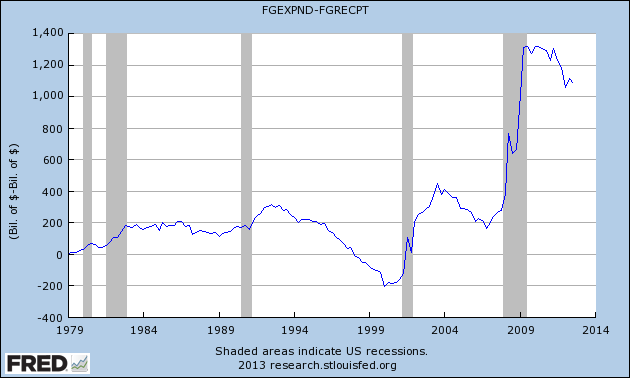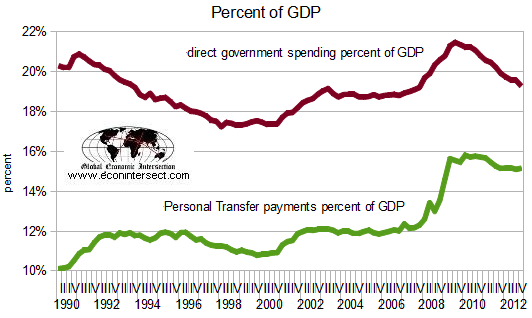CBO [Congressional Budget Office] requests appropriations of $45.7 million for fiscal year 2014. That amount represents an increase of $1.6 million, or 3.7 percent, from the $44.1 million (on an annualized basis) provided to CBO under the continuing resolution for fiscal year 2013. The increase would enable CBO to support 235 full-time-equivalent positions (FTEs), which would be roughly 7 percent less than the 254 FTEs funded in 2010 and in line with the FTEs funded between 2004 and 2008. The increase also would enable the agency to catch up on critical purchases of information technology and other items that are being deferred this year. The proposed budget represents the amount that CBO believes will be necessary to avoid a further reduction in the information and analysis that the agency provides to the Congress.
This request to the Subcommittee on the Legislative Branch, Committee on Appropriations, U.S. House of Representatives for fiscal year 2014 brought a smile to my (Steven) face. Is this another case of the pigs in Animal Farm putting themselves above the rest of the citizens? In any event, the budget increase of $1.6 million is below the noise level of the budget turmoil going on.
Sequestration debate (automatic budget cutting) continues, and this is the big picture: Sequestration is $1.2 trillion in automatic spending cuts over the next 10 years, with roughly $85 billion slated for this year. Estimates vary on headwinds to the economy but most seem to fall around 0.5% – a big number when one considers the economy only grew 0.1% in 4Q2013.
Most of you have made up your minds on sequestration. Econintersect has covered this “event” extensively this week . John and I have mixed feelings, which we will share.
Focusing on the Right Problem and Drawing the Wrong Conclusion: I (Steven) believe in balance. It does not bother me a bit for a sovereign government to overspend for periods of time. If the rule is that the government must tax to obtain its spending money – then the balance is obtained when expenditure equals income.
- Taxation removes money from the private sector (which it re-spends). Even the dumbest economist does not believe the economic effect of spending one government dollar exceeds the effect of spending one private dollar. If this is true, why tax? The current politicos have decided to go half way to eliminating taxes and spend much more than they take in. [The graph below is government expenditures minus income.]
- Economists are saying that it is too early to be cutting back on government expenditures as the economy is still fragile. We question where they were between 2004 and 2007 when the expansion from the 2001 recession was underway. Could it be true it is never a good time to cut back government spending?

Misusing the Tool: Across the board budget cutting is a tool used in the private sector. Our experience is that this tool is used at every business cycle contraction – and the cut is based on management’s estimate of the amount of contraction. The difference is management has a slush fund to be used to supplement the budget cuts in areas where the cuts would damage the organization.
Shooting the Wrong Intruder: The graph below tells the story. Sequestration strikes at direct government spending which is running at the historical average. I (Steven) would argue it is the money the government gives to its citizens (transfer payments) which is the real cause of imbalance. In this simple view, sequestration cuts the level of government – when the villain is transfer payments with growth going on untouched and unchecked. Should the solution be cuts in transfer payments, or higher taxes, or just let the deficit grow faster (sequestration cuts the rate of debt growth – but is far from stopping it).

Note from John: The transfer payments are in part a form of income redistribution. This is correctly so labelled when the payments are completely offset with taxes. But it is only partly redistribution from one part of the population to another. It is also a redistribution in time because a considerable number of the transfer payment recipients have contributed taxes to support the programs – think especially of Social Security retirement payments and Medicare insurance benefits.
I am troubled by the labeling these as entitlements with a negative connotation. For many they are entitlements with a positive connotation: They are receiving something they have paid for and therefore are entitled to receive.
On the other hand, there are direct income redistribution payments from higher earners to lower, such as the earned income tax credit.
We can debate whether such income redistribution methods should be utilized. But one thing is clear – they have not prevented an extreme point in income distribution “inequality” from happening. Even if you want to argue the policy is correct, it is hard to defend the position that the implementation has been effective at supplying more than a band-aid to cover increasing numbers experiencing low income.
The transfer payment policies implemented have not been effective in creating a broad income distribution compared to most of the period since World War II. And perhaps that observation is one that deserves more discussion.
Catch 22: Interest on the National Debt
What about the interest paid on the government debt? If that is paid out of tax revenue it is removed from amount that the government could spend on goods and services if we have a balanced budget – therefore it would be removed from the non-financial economy. If the government does not run deficits to pay that interest then the interest on the government debt is deflationary to the extent that money that would have been spent in the non-financial economy has been used instead to provide income for the financial sector.
Consider:
- This is not entirely interest paid to compensate the financial sector for use of their money. This interest is also paid for use of money that the banking sector creates out of thin air. (Banks do not lend deposits but create deposits by lending money.) Therefore it is more correct to label this, at least in part, a fee for service (creating money) than an interest payment for the use of existing capital.
- The economic fact of life is that, because essentially all money is created by issuing debt, both public and private, a balanced federal budget is deflationary and recessionary because we operate under a system which imposes a surcharge on the real economy (the non-financial economy) to pay the financial sector a fee (interest) for creating money.
- The separation of the service fee portion of interest from the usage fee for existing capital is likely not an easy task. But this is what would be needed to estimate the assessed cost paid for the service of creating new money.
Sequestration might be both good and bad . However, it will do little to reduce a budget deficit caused by a system giving more in transfer payments than the economy and the tax code were geared to provide. The solution is to change the way the economy is geared, cut budgets, increase revenue, and / or ignore the debt increases.
So far the politicos have decided cutting budgets and ignoring debt is the way to go. Is this like making a deal with Medusa? If you believe there are economic tipping points (and those tipping points can be caused by debt), the USA is still on a course to dance with that lady.
Other Economic News this Week:
The Econintersect economic forecast for March 2012 continues to show weak but somewhat improving growth. The supply chain contraction we saw last month has dissipated with all of our check methods of measuring the economy clearly in expansion territory.
ECRI now believes a recession began in July 2012. ECRI first stated in September 2011 a recession was coming . The size and depth is unknown. The ECRI WLI growth index value has been weakly in positive territory for over three months – but in a noticeable improvement trend. The index is indicating the economy six month from today will be slightly better than it is today.

Initial unemployment claims fell from 362,000 (reported last week) to 344,000 this week. Historically, claims exceeding 400,000 per week usually occur when employment gains are less than the workforce growth, resulting in an increasing unemployment rate (background here and here).
The real gauge – the 4 week moving average – also improved from 360,750 (reported last week) to 355,000. Because of the noise (week-to-week movements from abnormal events AND the backward revisions to previous weeks releases), the 4-week average remains the reliable gauge.
Weekly Initial Unemployment Claims – 4 Week Average – Seasonally Adjusted – 2011 (red line), 2012 (green line), 2013 (blue line)

Bankruptcies this Week: Ormet, Conexant Systems
Data released this week which contained economically intuitive components (forward looking) were:
- Rail movements are somewhat improving.

